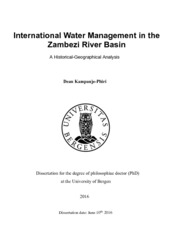International Water Management in the Zambezi River Basin: A Historical-Geographical Analysis
Doctoral thesis

Åpne
Permanent lenke
https://hdl.handle.net/1956/15986Utgivelsesdato
2016-06-10Metadata
Vis full innførselSamlinger
- Department of Geography [627]
Sammendrag
This study reconstructs the evolution of international water management in the Zambezi River Basin in a long-term historical and geographical perspective. The study explores water management by locating it in both a specific hydrological and historical context, and by focussing on hydropower developments and dams for two reasons. Since such undertakings have been controversial and contentious in modern history and they have particular consequences for other types of international and national river management practices, such a focus is thought fruitful. The study addresses four central objectives that are interconnected and are of theoretical and empirical interest. The first objective is to explore how the attempts to control the Zambezi River particularly through hydropower dams, have influenced the general management of water resources in the basin. The second objective is to explore how the notion of riparian rights has influenced the control and use of the Zambezi River and its important tributaries within the individual basin states considering that the Zambezi River Basin is an internationally shared water resource. The third objective is to explore the underlying reasons why the basin states sought coordinated management of the Zambezi River as they have concluded several basin and regional treaties to manage international waters since the mid-1980s. Lastly, the study aims to explore the ways in which major proposed water engineering projects in the Zambezi River Basin will shape developments in this region in relation to treaties that have been concluded in the basin and the region, as climate changes, and new global forces emerge, such as China. By collecting and assessing large amounts of relevant data both regarding hydrological, historical, economic and political issues in the basin, and by using different theoretical and methodological approaches discussed in the thesis, this study presents a broad, non-reductionist narrative of the history of the River Zambezi with a focus on how hydropower development changed the river and the relationship between societies and the river. More specific, it finds that the timing and mode of initiation of the big dams have had far reaching consequences for international water management in the Zambezi River Basin. The particular historical context in which the dams were implemented is important to understand and must be considered in assessments of later developments, since it helped to produce a fundamental contradiction or a mismatch in the international management of the Zambezi: Dams continue to serve interests of a particular state and sector while the international water management institutions that have been established, have been largely fashioned for strategic political reasons. While important legal agreements have been concluded, water issues have not been central in as far as agreeing on specifics such as rights and responsibilities of the states, consideration of geographic asymmetries, side-payments and issue linkage. The thesis discusses to what extent river basin cooperation will be enhanced if incentives to the individual states are made clear for their participation in basin-wide programmes.